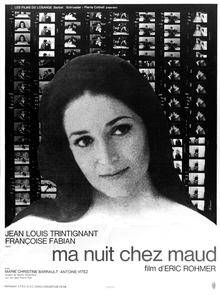Conte d'hiver [A Tale of Winter] (1992)
.jpg)
A Tale of Winter is to Sleepless in Seattle what Dial Code Santa Claus is to Home Alone . Okay, that's probably unfair to Sleepless in Seattle, which I don't actually think is a knockoff of Tale of Winter, but the parallels are interesting: French movies exploring similar ideas released a year earlier that are (in my opinion) significantly better than their American counterparts. A Tale of Winter is the second Christmas movie I've seen written and directed by French New Wave auteur Éric Rohmer, who also made My Night at Maud's twenty-three years earlier. I should also mention A Tale of Winter is the second of four films each representing a different season. At the very least I should probably have seen the first of those before attempting to write about this, but... well... I'm busy and have too many other Christmas movies to get to. Just in case it wasn't obvious from that "better than their American counterparts" gag, I liked this quite a bit. Tha...

.png)
.jpg)
.jpg)
.jpg)

.jpg)

